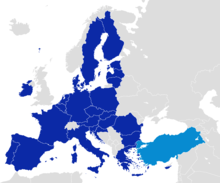
Turkey
Agreement in force
Agreement signed, but not applied
Agreement being negotiated
This page lists the free trade agreements signed by Turkey. [1] In 1995, Turkey signed a customs union with the European Union for goods, excluding agricultural products and services. As of 2018, EU has been Turkey's main trade partner with 50% of its exports and 36% of its imports. [2]
Contents
- List of agreements
- Signed
- Unilateral agreements
- Future
- Replaced agreements with EUCU
- Former
- References
- External links
